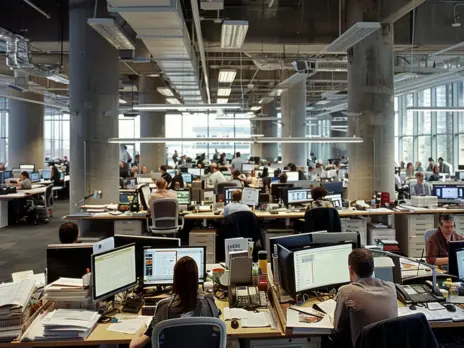Adrian
Monck thinks that if licence fee payers were consulted, they might
actually be willing to pay for high quality broadcasting
The BBC strike has given us some choice moments in broadcasting. For
news aficionados like me, it was hearing Jim Buchanan voice the lead
item on the One O’Clock News. Buchanan is deputy editor of the BBC’s
home news, but he was once a bona fide ITN reporter, so he’s an old
hand. And he’s not alone in being able to turn his hand to real telly.
Jon Williams, his boss, is a studio legend, able to perform every known
television task and some tasks that are as yet undiscovered.
This resourceful pair have a dirty secret. They are BBC managers.
They ought to be faceless bureaucrats who know nothing about television
news – but unfortunately they are talented journalists who helped keep
the show on the road when colleagues downed tools. They are also among
the managers who are asked to cut staff and budgets. It’s people like
them who’ll have to swing Mark Thompson’s axe.
If the strike
helped dispel one illusion it’s the one that says senior people in the
BBC don’t know how to actually produce programmes. They might – God
forbid – actually know what they’re doing. For BBC-bashers and
management-haters everywhere this is a bitter pill. But it also makes
painful swallowing for the director general.
Because cutting
things like the BBC News budgets won’t improve the news on the BBC. And
that goes for programme- making across the board.
There is one
solution to the BBC strike that no one’s proposing. So let me propose
it. Democracy. The dirty word so recently besmirched by four weeks of
lacklustre campaigning by our friends in Westminster.
Now don’t get too far ahead of me here. Some of you will be saying that democracy is what got us into this mess.
The
elected politicians want to see the BBC made to bleed a little before
its charter gets renewed. The corporation’s arteries will gush to the
tune of £355m and several thousand jobs. Of course, if the victims made
cars and lived in marginal constituencies there might be a cross-party
battle for a solution, but there’s only silence from the people’s
representatives.
The silence is because the politicians don’t
want to be seen raising taxes. Not in the broad light of day with the
curtains open and the neighbours peering in, that is. Taxes can only go
up in the dark and there’s no turning the bedroom light off on the tax
we call the licence fee. There are areas of our lives like health where
additional taxation to pay for better services is ingrained in Labour
Party dogma, but that argument doesn’t hold when it comes to the life
of the mind. The BBC is not worth the additional investment.
Mark
Thompson’s cure is like a medieval apothecary’s. He’s applying leeches
to every limb of the corporation, sucking out cash and jobs. He
wouldn’t put it like that exactly. It’s a process. He wants to “free up
money” for programme- making. But if he actually wants an extra £355m
for making programmes why doesn’t he just ask for it?
We know the
answer. That would mean raising the licence fee. The politicians won’t
allow it and besides the BBC is corpulent and wasteful and ripe for
attrition. Bleeding will do it good. The whole sorry, circular saga
continues.
At the same time the BBC has to be more accountable. Its stakeholders need satisfying, its governance overhauling.
And
this is where democracy could save it. Because taxation demands
representation, and a democratically run BBC, accountable to its
licence fee payers could do what elected politicians have secretly
managed to do since time immemorial. Raise taxes.
Democracy is
the secret nightmare of the BBC’s highest echelon and naturally of
politicians too. Imagine a minority of the licence-fee payers capturing
the BBC, a senior corporation figure told me privately. No irony
attached to this terrified statement.
The unintended comedy of
hearing one of the Beeb’s top people dismissing out of hand the system
by which we so recently chose a government makes satire almost
pointless.
There is a lot of voting at the BBC.
The BBC’s workers can vote to strike, its viewers can vote to save crumbling buildings or reward flower show gardens.
But when it comes to the big stuff – the budget – Auntie knows best.
The
governance of the BBC will not be interactive or text-based, or decided
by you and me. It will instead pass from governors to trustees. In the
words of chairman Michael Grade, they will “ensure that the interests
of licence fee payers are properly represented and protected through
the huge changes ahead”. And how exactly will they do that? Not by
electing anyone – that’s for sure. If democracy is the loser, the
winner will be marketing firms. Expect more pitching to test the
popular will by sampling, polls and focus groups and indecision
accordingly.
Expect the money to pay for all that to come from
the cuts imposed on frontline managers like the guys putting out news
bulletins on strike days. No one can argue that it’s impossible to do
what the BBC does for less money.
There are hundreds of channels
doing just that, right now, on a digibox near you. No-one can argue
that the BBC doesn’t dish out repeats, or make cockups on an epic
scale. But it is still a place where they don’t spell quality with a K,
and people might just be willing to pay for that if they were given a
say by the people at the top of the corporation.
Or by the people in Parliament afraid to let them.
Adrian Monck is head of journalism at City University, London
Email pged@pressgazette.co.uk to point out mistakes, provide story tips or send in a letter for publication on our "Letters Page" blog




